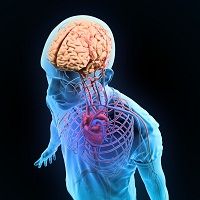Article
Strokes are a Risk Factor for Vascular Cognitive Disorder
Author(s):
The prevalence of vascular cognitive impairment and vascular dementia are increasing among the elderly. This presents a diagnostic problem, as about 40 percent of patients have coincident vascular cognitive disorder and Alzheimer’s disease pathologic processes

Strokes and transient ischemic attacks are risk factors for developing vascular cognitive disorder, according to findings published in Radiology.
Researchers from the University of Nottingham noted that the prevalence of vascular cognitive impairment and vascular dementia — the two main branches of vascular cognitive disorders – are increasing among the elderly. This presents a diagnostic problem, as about 40 percent of patients have coincident vascular cognitive disorder and Alzheimer’s disease pathologic processes, they said.
The researchers compared cognitively impaired and non impaired adults in order to investigate the links between cognitive disorder and carotid artery diseases. The 108 total participants underwent magnetic resonance imaging to determine carotid artery disease. The researchers then drew comparisons among the patients in categories like cognition, medial temporal lobe atrophy, lesion volumes, and global white matter ultra structural damage.
About half of the patients demonstrated cognitive impairment based on the results of the MRI tests. From this, the researchers learned the differences between the carotid artery disease and the cognitive impairments lay in the amount of the brain’s white matter.
"We found that microscopic damage of main white matter tracts allowed us to distinguish patients with symptomatic carotid artery disease and cognitive impairment from those who were cognitively intact," said the study's senior author, Dorothee P. Auer, Ph.D. in a press release. "Our findings mean that a simple MRI test might improve the diagnostic work-up of people with suspected vascular cognitive disorder, and holds further promise to track progression of the disorder."
The researchers added that they believe subcortical disconnection is a key factor of vascular cognitive disorder, a sort of breakdown of the communication between the specific brain regions. Dr. Auer said the phenomenon was analogous to one of the main subway line stops causing traffic problems.
"If vascular cognitive disorder follows a major stroke, the cognitive impairment typically develops suddenly, and can thus be well recognized," study co-author Dewen Meng, M.Sc. concluded in the statement. "In the majority of cases such a clear association is lacking, explaining why the detection of vascular cognitive disorder remains challenging."
Related Coverage
Swedish Study Examines Atrial Fibrillation, Transient Ischemic Attack and Stroke Risk
NOAC Showdown: Apixaban Comes Out on Top in MAYO Clinic Study
Platelet Profiling Yields Potential Marker for Stroke, Heart Attack Risk


